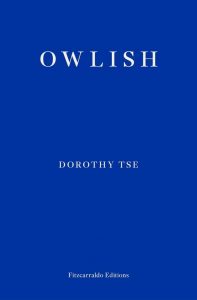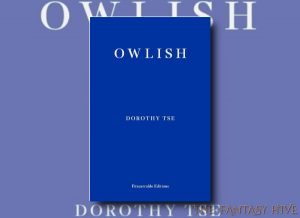OWLISH by Dorothy Tse, translated by Natascha Bruce (BOOK REVIEW)
Dorothy Tse – Owlish (2020, translated by Natascha Bruce 2023)
“He first saw her back, her spine like a giant millipede extending from her coccyx to her neck. Her legs were bent into two beautiful triangles, and she hugged them to her chest like a resting ballet dancer, her head between her knees. Professor Q drifted helplessly towards the glass. He placed his hands against its icy surface and stared, transfixed: she was not sitting, as he had thought, but lying inside a case turned on its side, the open end facing him. If the case had been upright, she would have looked like a curled foetus. He wanted to see more, to look longer at the purple veins faintly visible beneath that delicate skin, but then the lights went out and her body vanished into darkness.”
Dorothy Tse’s debut novel Owlish (2020, translated by Natascha Bruce 2023) is a gloriously strange and unsettling work of dystopian fiction. Set in the fictional city of Nevers, in which an academic escapes his dull life by embarking on an affair with a doll, Owlish recalls Angela Carter’s masterful The Infernal Desire Machines of Doctor Hoffman (1972), and the subversive dream-like brilliance of the New Weird, whilst being very much its own thing. Owlish takes what on the surface looks like a twee and whimsical premise and delves deep into the strangeness and uncomfortableness contained within. Tse has created a beguiling and uncanny work of surreal beauty that only subtly reveals its satirical and dystopian claws. Natascha Bruce’s wonderful translation captures Tse’s lyrical prose and off-beat sense of humour beautifully.
 Q is a professor of literature at the Lone Boat University in the city of Nevers, located on a mountain south of Ksana and previously occupied by the Valerian Empire for a hundred years before being handed over to the Vanguard Republic. Professor Q has just had his 50th birthday, and has spent a decade being overlooked for promotion. His relationship with his wife Maria has cooled from passion to routine. The only source of joy in his otherwise drab life is his secret collection of dolls. His life unexpectedly changes when a chance encounter in the antique markets of Valeria Island leads him to Aliss, an exquisite music box ballerina doll who becomes the pride and joy of his collection. Professor Q embarks on a passionate affair with Aliss, and on the advice of his enigmatic friend Owlish builds a love nest for the two of them in a church on a hidden island. He is overjoyed when Aliss magically comes to life, but the lovers’ bliss is short-lived as sinister forces are encroaching on Nevers, and Q unwittingly becomes a source of suspicion from the government.
Q is a professor of literature at the Lone Boat University in the city of Nevers, located on a mountain south of Ksana and previously occupied by the Valerian Empire for a hundred years before being handed over to the Vanguard Republic. Professor Q has just had his 50th birthday, and has spent a decade being overlooked for promotion. His relationship with his wife Maria has cooled from passion to routine. The only source of joy in his otherwise drab life is his secret collection of dolls. His life unexpectedly changes when a chance encounter in the antique markets of Valeria Island leads him to Aliss, an exquisite music box ballerina doll who becomes the pride and joy of his collection. Professor Q embarks on a passionate affair with Aliss, and on the advice of his enigmatic friend Owlish builds a love nest for the two of them in a church on a hidden island. He is overjoyed when Aliss magically comes to life, but the lovers’ bliss is short-lived as sinister forces are encroaching on Nevers, and Q unwittingly becomes a source of suspicion from the government.
Owlish slyly mutates from a quirky character study to a nightmarish depiction of life under a repressive regime, and somehow achieves this without any tonal whiplash. How Tse achieves this is quite remarkable. The novel’s dreamy, lyrical quality and bizarre flights of fantasy are contrasted with the banality of the rest of Professor Q’s existence, throwing into doubt whether Q is really experiencing all of these fantastical and strange events or if he is suffering from a complete mental breakdown. His experiences morph from his and Aliss’s erotic explorations of each other’s bodies, the sensual and sexual release he desires but doesn’t have with his disintegrating relationship with his wife, to paranoia and fear, visions of shadowy figures persecuting him and brutal police violence on the streets. Through this journey, the reader becomes aware of how much of Q’s alienation from his friends, his wife and his colleagues stems from his status as a refugee, and the elaborate fantasies he spins for himself and Aliss are at least partially driven by his unfulfilled desire for a place where he fits in as his home becomes increasingly hostile to him.
Until the situation in Nevers deteriorates, Professor Q is at least partially shielded by his status as a respected member of the middle class. As the novel progresses, it becomes apparent that Aliss indeed has an existence outside of Q’s fantasies, somewhat analogous to a victim of sex trafficking. Through Aliss’s perspective, in harrowing sections related in the second person, we are shown a shadowy nightmare world that exists parallel to the one the regular citizens of Nevers live in, one in which the line between automaton, slave and sex toy are constantly shifting. Is Alice really a doll, or one of the abused and mistreated mechanical people forced into uncomfortable and demeaning labour by the shadowy economy under the streets? Perhaps her own vision of herself as somehow not human is her attempt to displace the horrors she has experienced as much as a reflection of the dehumanisation she suffers.
As Owlish progresses, we get moments of lyrical beauty contrasted with nightmarish horror, as the novel draws towards its surprising and upsetting conclusion. The many layers of Tse’s narrative demand rereading and offer up alternative and contrasting readings, making it a novel of dizzying complexity despite its relatively slim length. Owlish’s bizarre and unsettling imaginings are a dark funhouse mirror reflection of our current world whose relevance slowly reveals itself. I shall be surprised if I encounter a more urgent or powerful exploration of our dystopian reality over the course of this year.

